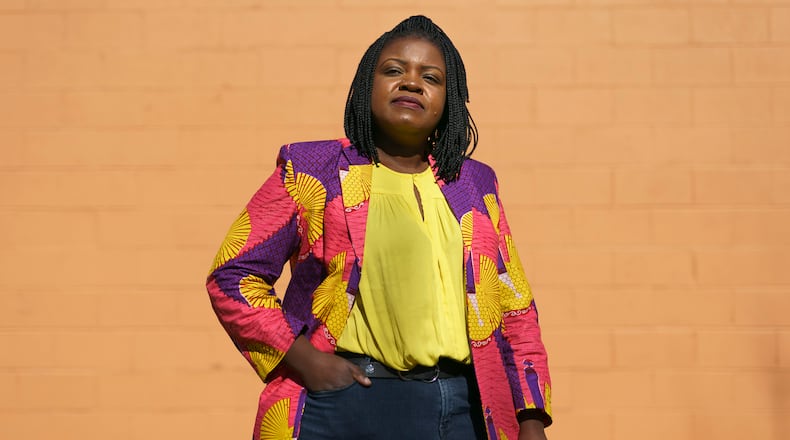Aimee Zangandou was just a teen in 1997 when she moved to metro Atlanta with her parents, leaving behind the violent aftermath of a bloody genocide in the family’s native Rwanda. They settled in Stone Mountain via the U.S. refugee program, a legal pathway into the country for people who fear for their safety back home.
Created under former President Jimmy Carter, the refugee program has allowed millions of vulnerable exiles from across the world to start new lives stateside, bringing profound changes to communities across the country — and helping reshape the face of metro Atlanta.
In DeKalb County, a steady stream of newcomers from places such as Bhutan, Somalia, Sudan, Liberia and Vietnam brought national attention to the refugee hub of Clarkston, earning the city monikers ranging from “the most diverse square mile in America” to “the Ellis Island of the South.”
But whether refugees will continue arriving in meaningful numbers is deeply uncertain. The 2024 presidential election has generated intense debate around immigration policy — the byproduct of years of crisis at the southern border — and, depending on the outcome, it could yield big cuts to the refugee program come 2025.
“It’s not easy to find the right words to describe what this moment feels like,” said Zangandou, now an executive director at Inspiritus, one of the five local resettlement agencies that help refugees relocate to Georgia. “Everybody’s nervous.”
The refugee program is coming off a banner year.
From October 2023 through September, Georgia resettled 3,227 refugees, more than all but 11 other states. Nationwide, the U.S. welcomed over 100,000 immigrants through the refugee program in that time span, a thirty-year milestone, according to U.S. Department of State.
The number of refugees who are vetted and cleared to come each year is decided upon by the president.
For the last three years, President Joe Biden has set the annual refugee cap at 125,000. His administration has also admitted tens of thousands of Ukrainians and Afghans through alternative humanitarian avenues outside of the cap.
That has marked a sharp break from the preceding administration. President Donald Trump set historic lows for refugee admission targets, reaching a nadir of 18,000 during his last year in office, with only 11,800 actually admitted.
Trump has said he would suspend refugee resettlement altogether should he retake the White House.
“It’s just such an opposite approach to this work,” said Paedia Mixon, chief executive officer at New American Pathways, a local resettlement agency. “It’s a really challenging thing to say that [after Election Day], something [could] happen that will change our operation night and day, dramatically.”
As a result of the Trump cuts, over 100 resettlement offices shuttered nationwide during his four years in office. In Georgia, local agencies saw their budgets slashed and were forced to downsize during the Trump years.
Inspiritus alone had an 80% capacity reduction in the Atlanta, and lost 50% of its staff across its entire organization, which also resettles refugees in Savannah, Nashville, and Birmingham.
“I think we all feel anxiety. I think the whole collective field feels anxiety,” Mixon said.
Credit: Miguel Martinez
Credit: Miguel Martinez
Following the Trump-era downsizing, building capacity back up to adapt to Biden’s much higher refugee caps proved difficult. According to agency leaders, suitable caseworkers need to have a specialized skill set to serve new immigrants, including extensive language skills, which explains why the restoration of the refugee program was slow-going.
The U.S. resettled roughly 11,400 refugees in 2021; 25,400 refugees in 2022; and 60,000 in 2023 before crossing the 100,000 threshold this year.
Unprecedented polarization
Refugee resettlement leaders say the newfound volatility in the federal government’s approach to refugee resettlement is the product of deepening polarization around immigration. As newcomers who arrive via a regulated, legal pathway, refugees hadn’t engendered significant backlash in the past.
But that has started to change.
“Ever since President Carter codified refugee resettlement, and even before that, it was a bipartisan issue. It was bipartisan supported,” said Justin Howell, executive director of the International Rescue Committee (IRC) in Atlanta, a resettlement agency that relocated more than 1,500 refugees from 34 countries in fiscal year 2024, 44% of whom were children.
“It’s only recently that our politics have gotten to the point where immigration has become so heavily politicized,” he said. “I wish we could get back and really look at it from a policy lens, actual data, rather than just emotion. That’s the problem. That’s what this is about, right? It’s about emotion.”
Mixon and Zangandou explained that concerns over border security have led some to conflate refugees with migrants who come to the country illegally.
“There’s some rhetoric around the idea of there being a ‘good’ immigrant and a ‘bad’ immigrant. But I feel like anti-immigrant sentiment is anti-immigrant sentiment. It impacts refugees. It impacts everyone,” Mixon said.
According to Zangandou, evolving political realities and increased “animosity toward the work that we do” have led Inspiritus to spend more time thinking about safety for staffers and refugees.
A new sudden change in policy could have severe implications for agencies like Inspiritus, and it could represent a turning of the page for communities like Clarkston. Still, Zangandou said those facing persecution in other countries would be most affected, if the U.S. refugee program is drastically reduced or no longer exists.
“It’s about life and death for them,” she said.
Resettlement leaders say people locked out of the refugee program may see no other choice for themselves but to try to reach the U.S. via the southern border, and try their luck there.
About the Author
Keep Reading
The Latest
Featured




